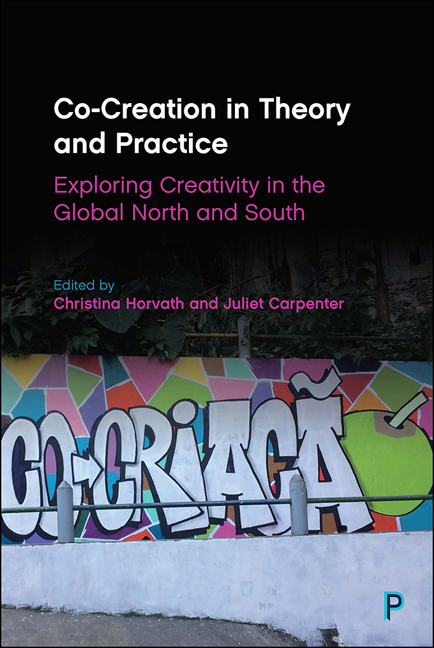13 - We Can Make: Co-Creating Knowledge and Products with Local Communities
Published online by Cambridge University Press: 18 March 2021
Summary
Introduction
This chapter explores the role that Co-Creation plays in the work happening at Knowle West Media Centre (KWMC), Bristol, UK, through the lens of two case study projects: The Bristol Approach, which is about addressing digital exclusion and tackling inequalities, and We Can Make, which is about Co-Creating new approaches to housing. Both projects help to demonstrate how KWMC has been working, since 1996, in ways that start with people and bring together arts, artists, other expertise, digital tools and data to explore and address people's concerns and priorities through Co-Created creative interventions.
For KWMC, Co-Creation is understood to be: ‘… a cooperative process whereby people with common interests, often with diverse skills and experiences, work together non-hierarchically towards a change they want to bring about’ (KWMC, nd). A key aspect that allows this ‘non-hierarchical’ practice to function is the collaborative definition of an overarching common goal around which people from different backgrounds (both in terms of socioeconomics, cultures and disciplinary specialisms) can cluster and focus energy. At the start of every project, it is essential to give time to defining and Co-Creating a shared mission of change. With a clear headline intent, participants can then voluntarily contribute as little or as much as is appropriate and could be involved in only one small aspect, knowing that their participation is still moving towards the overall mission. To enable this process to work everyone has to have a willingness to contribute to the overall shared goal as well as the agency to participate and contribute in different ways. Facilitators of Co-Creation play a key role in ensuring a process of ‘non-hierarchical’ Co-Creation is possible. Rather than denying different knowledge and expertise, KWMC facilitators apply processes where all skills are valued and acknowledged, ground rules are established early on, and in turn safe spaces that flatten hierarchical power dynamics are created. Artists are often employed as facilitators using tactics such as ‘play’ to cross boundaries, remove fear and create spaces where change on both a community and individual level can happen.
Information
- Type
- Chapter
- Information
- Co-Creation in Theory and PracticeExploring Creativity in the Global North and South, pp. 207 - 222Publisher: Bristol University PressPrint publication year: 2020
